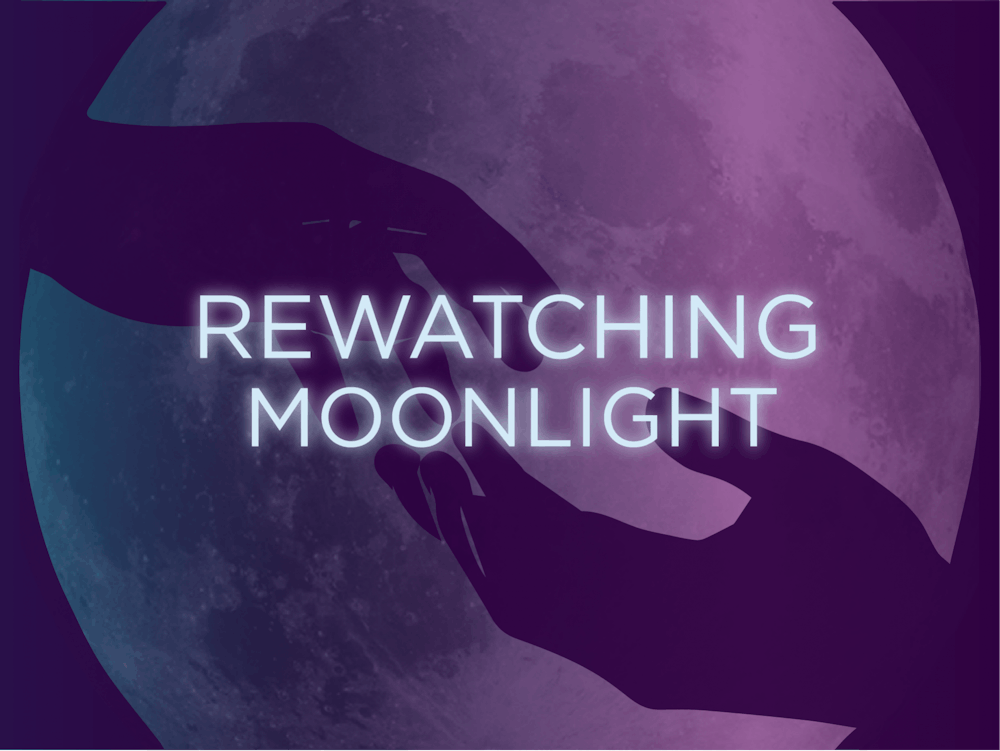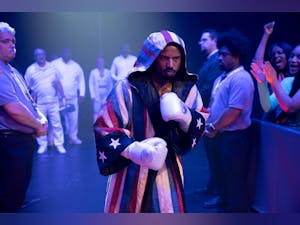From: Silver Screen
Rewatching ‘Moonlight’: The ode to touch and everything else sacred

One of the five love languages is touch, and Barry Jenkins seems to worship it in his film “Moonlight.” In its quietest moments, the film reaches out, fingers spread, begging to be held, carried, caressed and touched.
But it isn’t just touch between anybody; it’s touch between Black men that Jenkins reveres.
“Moonlight” has many feats, including its representation of Black-centric life and community in the absence of invading whiteness and its enchanting cinematography, but one of its most important achievements is how we, as witnesses to the film, are shown touch and its impact on Black men.
It’s important to consume films made by Black creatives all the time, but especially during Black History Month, which comes amid a public reckoning with racial justice and a pandemic that has left us with only media to tell our stories.
“Moonlight” is important to watch now because it’s a story about Black queer people whose voices aren’t often heard. It navigates the intersection of being gay and being Black, of being alive while being terrified, of feeling loved while knowing there are those out there who may hate you for who you are. And Jenkins’ reverence toward touch, its ability to transform and inscribe, is especially beautiful as unlimited touch has been taken from us for almost a year. Seeing how healing touch can be is cathartic now.
Jenkins’ reflection on Black men at peace with touch is also an image that subverts the videos of murdered Black men we’ve seen reposted on social media and rebroadcast by news outlets without reservation. This past summer, Black Lives Matter activists protested for the need to be visible, the right to even be alive. Back in 2016, with “Moonlight,” Jenkins affirmed the need for everyone to see what it means for Black men — and Black love — to live.
In “Moonlight,” Black men are not the violent criminals media outlets so often make them out to be. From D.W. Griffith’s villain in blackface in “The Birth of a Nation” to today’s oversaturation in news about crimes committed by Black men, Black men in media are criminal, despicable and brutish.
Jenkins lets us glimpse reality, however, and we see genuine touch between Black men that doesn’t fit the buck mold of Hollywood stereotypes. To witness Jenkins’ representation of Black men is to witness the truth.
“Moonlight” follows the main character, Chiron, from his youth to his adulthood, along the way documenting how touch transforms his sense of self. Black men are the catalysts for Chiron’s personal discoveries and adaptations of sexuality and masculinity, and he experiences the multitudes of what it means to be a Black man.
One of the film’s most memorable and beautiful moments is when Juan, played by a nearly omnipotent Mahershala Ali, carries Chiron into the ocean to teach him to swim. Chiron has grown up without a father figure, but here Juan cradles him chest to chest, like a father. The Black man is on display, but it isn’t to be physical or intimidating; it’s to be human.
As waves lap over Chiron and even onto the camera lens, Juan’s comforting touch baptizes Chiron. For the first time, Chiron sees Black masculinity as holy, reverential, everything opposite of what we, especially white viewers, might expect of Black men.
Jenkins’ ode to touch continues at the beach when Chiron experiences his first sexual awakening with his long-time friend, Kevin (Jharrel Jerome). In this instance though, Jenkins switches tactics. Rather than showing us the touch and letting us invade this transformative moment through our voyeuristic needs, he cuts away.
We watch the backs of their heads resting together, Kevin cradling Chiron as Juan did. We don’t get to imbue our expectations of Black men or Black sexuality onto Chiron and Kevin. Under the blue tinted moonlight, this experience of touch is theirs alone.
Chiron may be the main character of this film, but he certainly doesn’t vocalize much. It’s the touch he receives and gives that expresses himself, intimately and subversively. Chiron’s connections with other Black men shape him without the interference of any outsiders (“Moonlight” does not feature any white people), including the audience.
“Moonlight” will not join the ranks of past cinema that fetishized or brutalized Black men. Jenkins lets Black men exist as they are, together and close and alive, within the reach of fingertips.
Our desire to look without reservation has been challenged. Film is all about looking, but how do our gazes impact those we look upon? What do we miss? When we are forced to think about what we’re seeing and how we’re seeing it, who are we setting free?
And when we get to touch again, limitlessly, touch gently, fingers spread and know you’re living.




